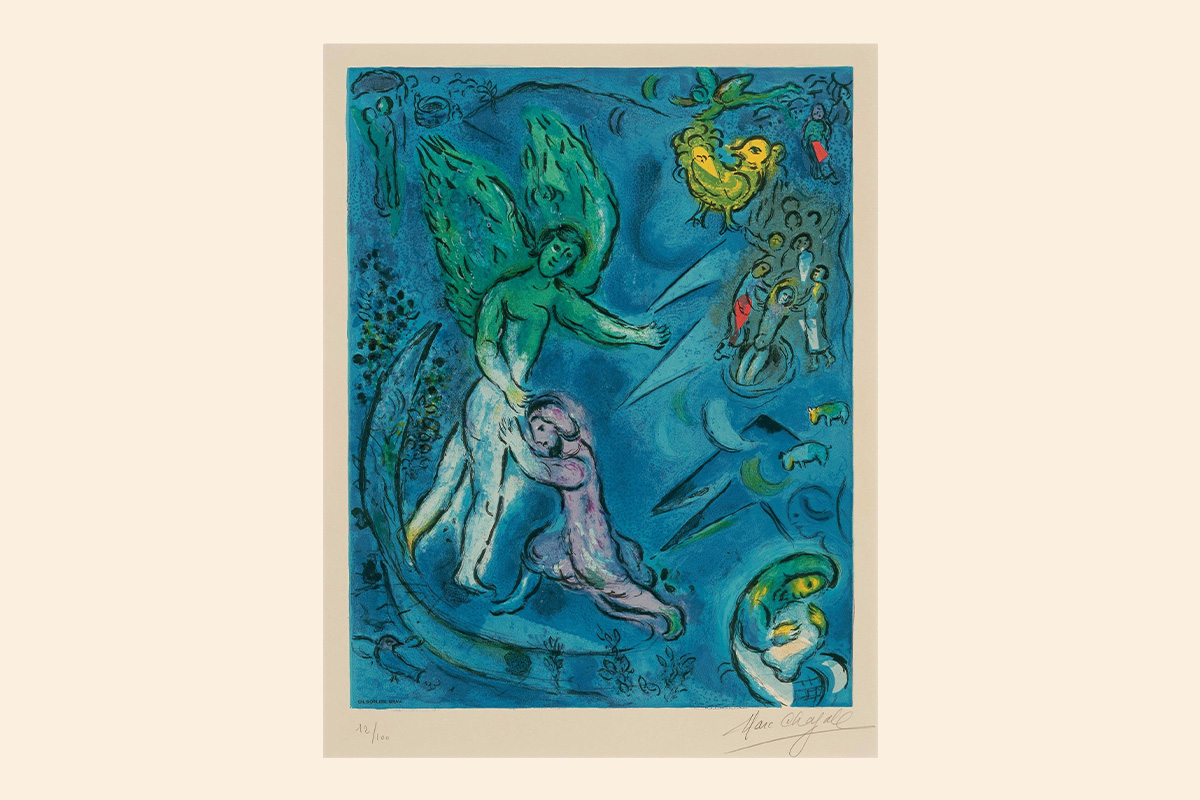
Let us leave aside, although the author considers it briefly, the encounter between two material objects, between two plants, between two animals, which in each case follows different laws according to their respective modes of being.
We are talking about meetingwe are told, properly when a man contacts reality. It is not yet an encounter if it only seeks, for example, to satisfy its hunger, although it may go beyond instinct. Just as it is not yet a simple clash between two people.
Two initial conditions for a (personal) encounter to take place, according to Romano Guardini1) the encounter with the reality beyond a simply mechanical, biological or psychological interaction; 2) to establish a distance reality, to focus on its uniquenesstake position to it and to adopt a conduct practice with respect to it.
This requires freedom. In freedom, two sides can be seen: a material freedomthrough which we can enter into relationship with everything that surrounds us; a formal freedomThe person's own initial energy, as the faculty to act (or not) from the person's own initial energy. Sometimes the person can come to the conviction that one should not trust everything that comes one's way: "He can close the doors of his heart, and shut out the world. The ancient Stoa [school of Stoicism] did so, and so behaves religious asceticism, to direct love only to God" [1].
The meeting can start only on behalf of the personFor example, in front of something that awakens our interest, such as a fountain, a tree or a bird, it can become an image of something deeper or even help us to radically understand existence. This, provided that habit, indifference or snobbery, conceited and self-satisfied presumption are overcome [2]. Such are the main enemies of the encounter.
But the meeting can also be bilateral, and then a special relationship arises, in which two people value each other more deeply, beyond their mere presence or their social functions: they become a "you".
Like contents of the meeting Guardini lists:
In addition, the meeting requires that a good timeThe moment is a propitious moment, made up of thousands of more or less conscious or unconscious elements: past experiences and images, energies and tensions, needs, environment, state of mind, creative and affective elements, etc. Hence the difficulty or impossibility of make an encounter, and the opening of the encounter to approach Providence and fate.
The meeting requires, therefore, at the same time, freedom and spontaneityIn the sense that it only happens if it is not searched for, as would be the encounter with a blue flower that opens the way to the treasure.
The encounter phenomenon can be described by its metaphysical sideThat is, what concerns the very being of the encounter: why is it the way it is, how did it come about? This is attested to by the experience of the wise. Above all, that the great things have to be giftsare not enforceable and cannot be forced.
"This points to an objective creativity that is above the individual and human; to an instance that directs, condenses and 'writes' the situation with a wisdom and originality before whose sovereignty human actions turn out to be silly and elementary.
For this reason, every authentic encounter awakens the feeling of to find oneself in front of something undeservedand also of gratitude or, at least, of surprise for how curiously and well everything has turned out.
These reactions need not always be conscious; but they form an attitude (an element that, depending on the outcome and the circumstances, can become overwhelming" 3].
The encounter can be described, as Guardini also does, on the psychological sideThe encounter is subtracted before what we call concentrationThe encounter resists the search for the useful, the systematic, the pedantic and diligent. The encounter resists the search for the useful, the systematic, the pedantic and diligent.
"Frequently encounters are given away to people who do not strive for them, who may not even apparently deserve them (happiness)..." [4]. It is felt that it has been a gifted crossroads of freedom and necessityMany circumstances, perhaps seemingly coincidental, have come together to make it happen, and the curious feeling arises that "it could not be otherwise".
The meeting has, in third place, relationship with the spiritual and the religious, insofar as it represents a personal achievement or success, thanks to a factor that does not come simply from work or human foresight, which could degenerate into pure habit without joy or emotion.
This factor, while respecting freedom, directs existence towards a certain fullnessThe encounter therefore affects the encounter, without letting it become, on the other hand, an unstable adventure and a toy of the moment. That is why the encounter affects the spiritual center o inside of the person.
This is so, Guardini points out, "because in the encounter what emerges is not only what is essential and singular, but also the mystery" [5]. "The moment I encounter a thing or a person, they can take on a new dimension, the nun.
Then everything becomes a mystery; and to this responds admiration, gratitude, emotion". Guardini adduces the event narrated by St. AugustineHe tells of how he was relieved of a severe toothache after going to his own and others' prayers (cf. Confessions, IX, 4, 12).

In order to show what he considers to be "the core of the meaning of the encounter", Guardini resorts to some words of Jesus on the road to Jerusalem. It should be noted that these words always have a special meaning for Guardini, because they are linked to a transcendental moment in his life, when he experienced a conversion both intellectual and spiritual [6]: "....Whoever wishes to save his life (psychelife or soul), he shall lose it; but whosoever shall lose his life for my sake shall find it.", Mt 16:25).
These words refer to man's way of behaving in his relationship with Christ and, according to Guardini, they are keys to understanding human existence in general. They come to mean: "He who clings to his self in his own being will lose it; he who loses it for the sake of Christ finds it" [7].
And Guardini explains this somewhat paradoxical expression (since it is getting lost what leads to meet): "Man becomes himself freeing themselves from their selfishness. But not in the form of lightness, superficiality and existential emptiness, but for the sake of something that deserves that for its sake one runs the risk of not being him" [8].
How can one be liberated from oneself in this sense? This, Guardini answers, can happen in many different ways. For example, before a treeI can think simply of buying it, taking advantage of it, etc., that is, of its relationship with me. But I can also consider it in another way, in itself, contemplating its structure, its beauty, etc.
Another example given by Guardini is that of two students One works with an eye to his future, to his opportunities and the benefit he can get from such and such a subject or such an exam, and he will end up being a good lawyer, doctor or whatever. The other is interested in the subjects themselves, in research, in the truth, and may end up with a reasonable career.
For the former, science is a means to an end, which consists in affirming oneself in life. The second is open to the object, putting at the center not himself but the truth. And this was self-realized as his self grew in contact with the advances of his approaches and research.
Other examples would serve, Guardini points out, in connection with friendship y love (calculating and authentic friendship; love based on appetite and personal love).
"Friendship is born only when I recognize the other as a person.I recognize its freedom to exist in its identity and essence; I allow it to become a center of gravity in its own right and experience a living request for this to actually happen... Then the form and structure of the personal relationship, and the state of mind with which I approach it, become the same.
The relationship is centered on the other person. Realizing this, I continually distance myself from myself and thus find myself, as a friend, rather than as an exploiter; free rather than bound to my own benefit; truly magnanimous, rather than full of pretensions"[ 9].
Guardini concludes his reflection by offering a conclusive interpretation of the ultimate meaning of the encounter, we would say, in the light of a Christian anthropology. It is, therefore, important as a key to a pedagogy of faith.
First from an anthropological level. And then, anthropological-theological, in relation to the Christian revelation: "Man is made in such a way that from the outset he manifests himself in an initial form, as a project. If he clings to that project, remains closed in on himself and does not move on to surrender, he becomes increasingly narrow and petty. He has 'kept his soul', but has been losing it more and more.
On the other hand, if it opens up, if it surrenders to something, it becomes a field where the other can appear (the country he loves, the work he serves, the person to whom he is attached, the idea that inspires him), and then he becomes more and more profoundly and properly himself" [10]. Moreover, in the encounter with the surrounding world, man incarnates what he is and creates by making culture in its broadest sense [11].
"This going out of oneself can be more and more complete. It can reach a religious intensity. Let us bear in mind that the term with which a very high form of religious commotion is expressed is that of 'ecstasy', which means precisely to be taken out of oneself, to be outside oneself.
It is necessary to think that, as happens in all relationships, ecstasy is not unilateral, that is to say that it does not affect only the person who goes out of himself in search of the one who goes out to meet him, but he also goes out of himself; his being goes out of the arcane of his own self. He reveals himself, he opens himself" [12].
Man becomes truly man when it comes out of itself responding in properly human events. Well then: "The meeting is the beginning of this processor, at least, it can be.
It represents the first touch by what comes our way, by virtue of which the individual is called to leave his immediate self and renounce his egoism, encouraged to go beyond himself in pursuit of what comes his way and opens up to him" [13].
All of this can undoubtedly be educated in the sense of facilitated, encouraged, and guided by means of a pedagogy of encounter.

In his pedagogical writings, Guardini shows the role that the encounter plays in education as a whole. On the basis constituted by the form (structure of the concrete personal existence) that unfolds in the "formation with the help of education, the person is also realized thanks to the encounter, in the midst of the movement of becoming and of the multiplicity of its phases in the diversity of factors of one's own being and in the plurality of its determinations" [14].
All this is part of the pedagogy of the subjective or immanent aspect of the person.
To this must be added the objective or transcendent aspect of the person (in relation to ideas, norms and values: reality, the world, people, history, culture, God, the Church, etc., which are worthwhile in themselves and not primarily for their meaning for me).
The latter is carried out by means of the pedagogy of the acceptance (acceptance of the objective, as it is) and of the service (surrender to what reality asks of me)[15]. In this transcendent aspect, Guardini will say, is founded human dignity.
Education must teach the discernment The question of what should be the center of gravity of each personal action, taking into account the whole: the personal form, the encounter or the service. To teach how to make these decisions with authentic freedom: this is what is proper to pedagogy.
REFERENCES:
(*) Cf. R. Guardini, "The Encounter" in Id, Ethics. Lectures at the University of Munich (collected texts from 1950-1962), BAC, Madrid 1999 (original German 1993), pp. 186-197; Id., "L'incontro" (essay published in German in 1955), in Id, Persona e libertà. Saggi di fondazione della teoria pedagogica, a cura di C. Fedeli, ed. La Scuola, Brescia 1987, pp. 27-47.
[1] Persona e libertà, 32.
[2] Cf. ibid., 34.
[3] Ethics, p. 192.
[4] Ibid.
[5] Ibid., 193.
[6] Cf. https://iglesiaynuevaevangelizacion.blogspot.com/2018/10/50-aniversario-de-romano-guardini.html.
[7] Ethicso. c., o. c., p. 194.
[8] Ibid., 195. In this regard, it is worth recalling what the Second Vatican Council said ten years later in Gaudium et spes, 24: "Man, the only earthly creature whom God has loved for himself, cannot find his own fullness except in the sincere gift of himself to others".
[9] Persona e libertà, 45.
[10] Ethics, 196.
[11] Cf. Guardini, Foundations of training theory, EunsaPamplona 2020, 51s.
[12] EthicsThis is what happened, in fact, with Christian revelation (in which God communicates himself to man) and, in another way, in every authentic awareness of one's own vocation.
[13] Ethics., 197.
[14] Foundation of the theory of formation, 80s.
[15] Cf. ibid., 82-88.
Mr. Ramiro Pellitero IglesiasProfessor of Pastoral Theology at the Faculty of Theology of the University of Navarra.
Published in his blog Iglesia y nueva evangelización.